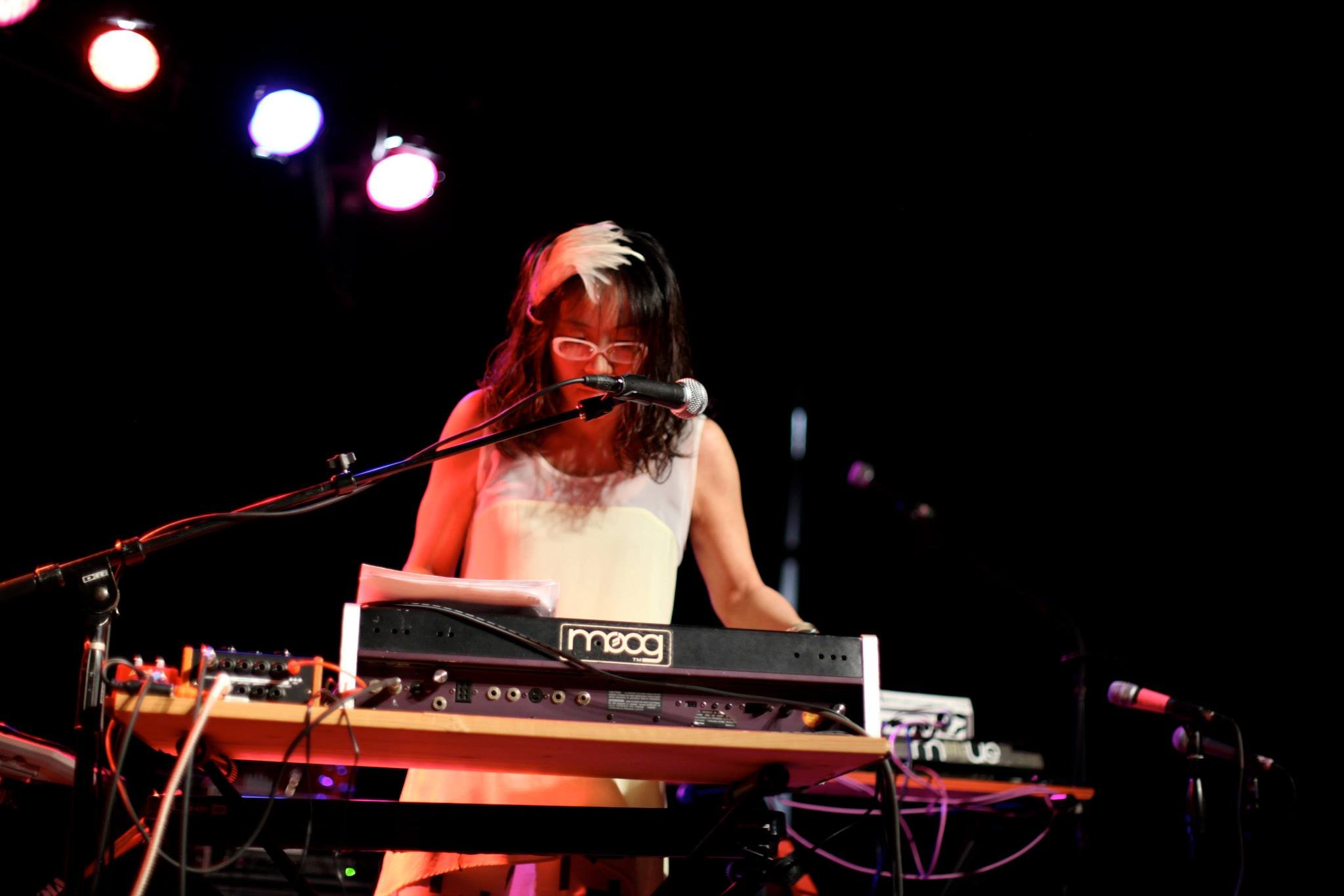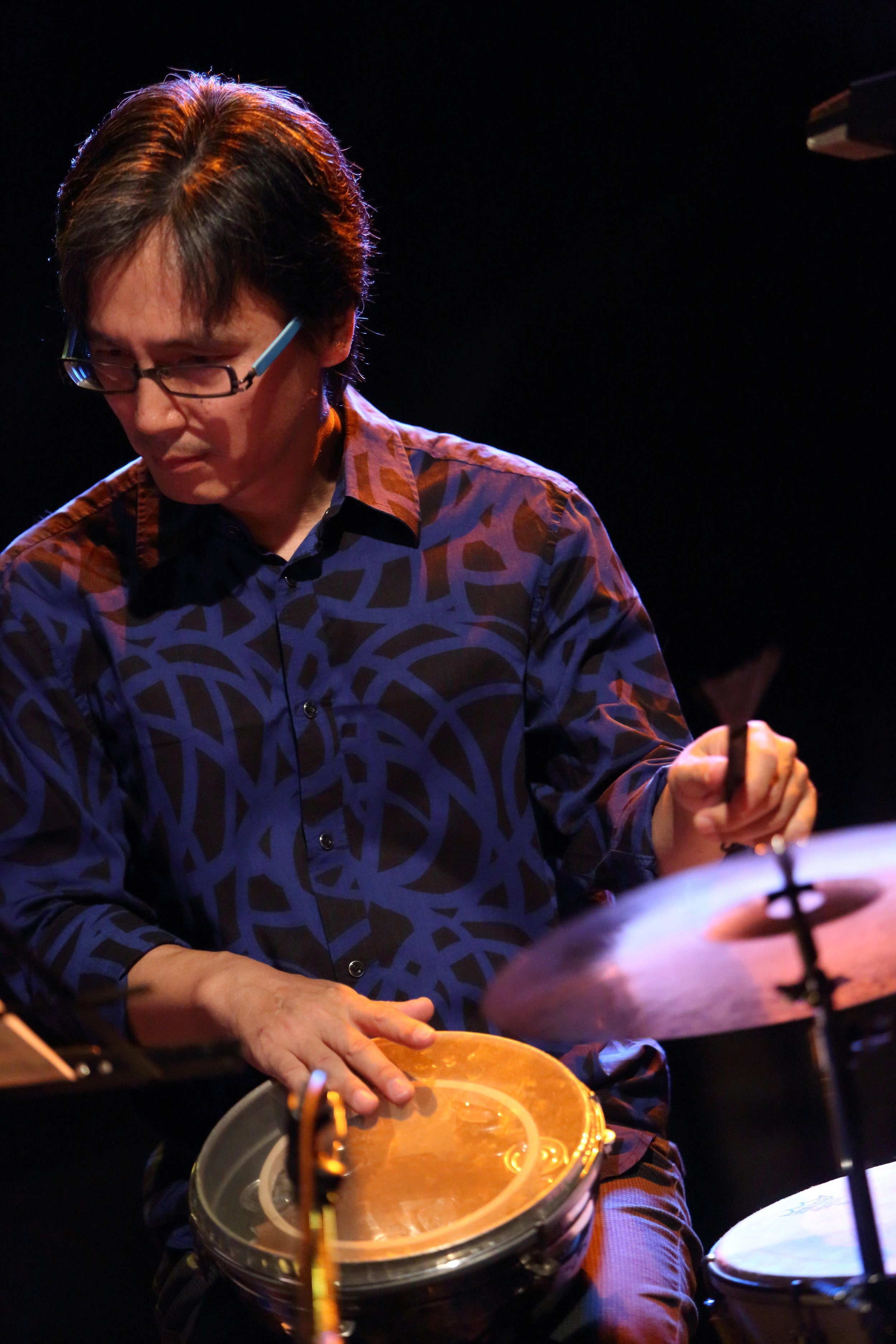Vortex headed for MetroWest
Vortex is Shoko Nagai (piano, accordion, analog synthesizers, electronics) and Satoshi Takeishi (traditional Western and Eastern percussions). The duo’s improv-driven mission is to integrate cultural, technological, and musical elements that surround us in everyday life into coherent structures, expanding the sonic palette of contemporary jazz. In advance of their gig at atac on October 28, 2023, we spoke with Shoko via email.
atac: Shoko Nagai, welcome. How did music enter your life?
SN: I started performing music at the age of four with a Yamaha Electone, which is a computerized organ with hundreds of sounds, a drum machine, and full pedal keyboard. I was in the Yamaha Music Foundation system in Japan all of my younger years of music education, and eventually became their contracted teacher and a performer at the age of twenty.
atac: Two parter: What were some of the earliest compositions you learned to play, and did you ever participate in Yahama’s World Popular Song Festival?
SN: I learned the earliest compositions via Bach, Mozart, Beethoven (donating, sonata), and Stravinsky. I almost made that festival! I was a “Medalist of Right” before the international festival when I was 26 years old.
atac: I believe you’re no longer teaching—why’d you move on from the profession?
SN: Although I had over 100 students and a solid job at Yamaha, I felt that I needed to do more with the music. So I decided to come to the US to study jazz, which was the turning point. It was at the ensemble class assignment at Berklee College of Music where I played with other musicians for the first time in my life.
atac: So community is really important in your practice?
SN: For me, the best thing about music and musicians is getting to know about the world we live in. By touring and performing in different countries, I get to see a side of cultures which I wouldn’t get to see as a tourist. And performing with the musicians from all over the world in NYC, I get to know a little bit about the culture I would never be able to experience.
atac: Any specific examples; special places?
SN: Finland, Sweden, the Netherlands and most of Europe were all great places to visit and perform, but memories of Israel and Poland stay with me as stunning experiences. Interaction with the people of places you’ve never visited has the most powerful human experience of all to me.
atac: How about back home? Favorite NYC venues?
SN: Definitely Roulette and The Stone for me. They are meaningful places to show my own achievement with a high listening level of audiences.
atac: For sure. And ISSUE, The Kitchen…but music isn’t the only challenging thing in NYC. It can be a hard place to find your way.
SN: When I first came to NYC, the first three years were really hard. Making a living as a professional musician anywhere is hard but especially in NYC because of the competition, the cost of living, etc. But if you already are an aspiring creative person, then you already found your path. Stay on it and be humble.
atac: Outside of music, what’s inspiring you lately?
SN: I have a personal spiritual practice, love watching athletes compete, and watching movies.
Left: Shoko at Littlefield, Brooklyn. Photo by yutack gabriel kang. Right: Satoshi Takeishi.
atac: Tell me more about sports.
SN: Tennis is my favorite sport! I used to play, but mostly watching games these days. They [tennis players] give me motivation for life because of the process of hard work and mental training to achieve their goal. Just like in music, it could be a very painful process to create good music. They are models for me.
atac: Your music today is more experimental and avant-garde than the music of your upbringing—how does the former inform the latter? What lessons from early music education have stuck with you?
SN: Most of the traditional music has a framework to follow while you learn the art form. There are rules which can’t or shouldn’t break. But once I educated myself with these frameworks in Classical and Jazz music, I wanted to break the wall to find my own vocabulary to express my identity. Early music education will always stay inside and become reference to what you want to achieve later.
atac: For the Vortex show, what’s the vibe?
SN: It will be challenging music to listen to for some. Every composition in this concert is connected to the end. I guarantee that you will feel peaceful closure at the end of the concert.
atac: I wanna close this out by revisiting teaching. What's something you learned from your students that’s stayed with you?
SN: Pureness, energy, and patience.
*
Vortex, the duo of Shoko Nagai and Satoshi Takeishi, plays atac on Saturday October 28, 2023. Grab tickets today; it’s going to be a great night.
Tags:



